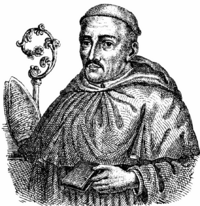Vincent Kadlubek
| Wincenty Kadłubek | |
|---|---|

Wincenty Kadłubek
|
|
| Bishop of Cracow, Blessed | |
| Born | 1161 Karwów, Poland |
| Died |
8 March 1223 Jędrzejów, Poland |
| Venerated in | Roman Catholic Church |
| Beatified | 18 February 1764 by Clement XIII |
| Feast | 8 March |
| Patronage | Sandomierz |
Blessed Wincenty Kadłubek (1161 – 8 March 1223), also known as Vincentius de Cracovia, Vincent Kadlubek, Vincent Kadlubo, Vincent Kadlubko, Vincent of Kraków, Master Vincentius, was a thirteenth-century Bishop of Cracow and historian of Poland.
Vincentius was born in Karwów near Opatów and studied in France and/or Bologna. Upon the death of Fulk, Bishop of Kraków (Cracow), on 11 September 1207, Vincentius was elected to the office. Innocent III approved the election, and Kadłubek was consecrated by Henry Kielicz, Archbishop of Gniezno.
He followed Gallus Anonymus in further developing the idea of the Latin proverb vox populi vox dei ("the voice of the people is the voice of god") and argued that the ruler (king) should always follow a council that includes bishops and representatives of clans, since not the ruler but the council has higher authority originating from the laws of God. He also claimed that the ruler should be elected by the council and rulers abusing their power should be removed.
In 1215 Vincentius participated in the Fourth Council of the Lateran.
In 1218, Vincentius resigned and entered the monastery of Jędrzejów. He became the first Pole to join the Cistercians. He was buried before the high altar of the abbey church. In 1682, king Jan III Sobieski petitioned the Holy See for his beatification. A similar request was made in 1699 by the General Chapter of the Order of Cîteaux. On 18 February 1764 Vincentius was beatified by Clement XIII.
...
Wikipedia
